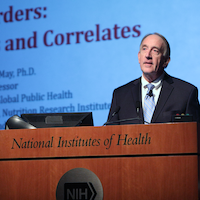December 17, 2018 – Philip A. May, PhD, has received the 2018 Mark Keller Award bestowed by the National Institute on Alcohol Abuse and Alcoholism (NIAAA) at the National Institutes of Health (NIH).
May is Professor at the University of North Carolina at Chapel Hill in the Gillings School of Global Public Health where he works from the UNC Nutrition Institute as an epidemiologist. The Mark Keller Award, established by the NIAAA as a tribute to Mark Keller’s pioneering contributions to the field of alcohol research, is given annually to an outstanding alcohol researcher whose work makes significant and long-term contributions to our understanding of how alcohol affects the body and mind; how we can prevent, diagnose, and treat alcohol misuse and alcohol use disorder (AUD); and how today’s scientific advancements can provide hope for tomorrow. Keller Award honorees are nominated by NIAAA peers and approved by the institute director. “I am truly humbled to have been nominated by my peers in the alcohol research field. And I am particularly pleased and honored to receive this award from NIAAA, the research Institute and its staff to whom I am truly indebted for all of the advice, support and encouragement over the past 30 years,” said May.
As the awardee, May was the featured lecturer in the Mark Keller Honorary Lecture Series at NIAAA in Bethesda, Maryland, on November 29, 2018. His presentation highlighted the work of his multidisciplinary clinical and epidemiological research team from several universities across the United States and South Africa. With this team, May is principle investigator of studies funded by NIAAA to research the characteristics of the continuum of fetal alcohol spectrum disorders (FASD) in the general populations of South Africa, the United States, and Italy. He and his colleagues have consistently focused on refining the diagnostic criteria for the FASD continuum, defining maternal risk and protective factors for FASD, and uncovering and quantifying the wide variation of outcomes and phenotypic traits of children in general populations who have been prenatally exposed to alcohol.
His multiple studies of the population-based prevalence and characteristics have provided some answers to key scientific and public health questions such as: proximal and distal maternal risk factors for FASD linked to specific child outcomes, the impact of alcohol use during the breast feeding period, the utility of new biomarkers of alcohol use, quantifying whether case management can improve child outcomes in high risk pregnancies, and improving the development of children with FASD through cognitive/behavioral and nutrition interventions. It is his hope that through these multivariate epidemiology and causal studies and the evaluation of basic interventions for children with FASD have helped fuel a significant reduction in the occurrence and severity of FAS and other FASD now and in the future. “FASD are very common in the United States and every community in which my team and I have worked. They represent a pernicious health disparity that no one should have to endure,” said May. In a recent publication in the Journal of the American Medical Association (JAMA), May and his colleagues reported that FASD affect an average 2.2% to 6.5% of all first grade students in the general populations of four communities in four different regions of the United States.
In addition to his appointment at UNC Chapel Hill, May is Professor Emeritus at the University of New Mexico where he served for 33 years, and holds titles of Extraordinary Professor on the Faculty of Medicine and Health Sciences of Stellenbosch University in South Africa, and Adjunct Professor of Pediatrics at the Sanford School of Medicine of the University of South Dakota. His research over the past 25 years has been primarily on the prevalence and epidemiological characteristics of the full continuum of fetal alcohol spectrum disorders (FASD). He served as a member of the groundbreaking Institute of Medicine Study Committee on Fetal Alcohol Syndrome (1994-1996). He has also been honored with the Henry Rosett Award from the FASD Study Group of the Research Society on Alcoholism, an Excellence Award from the National Organization Fetal Alcohol Syndrome, and has twice delivered the Geoffrey Robinson Memorial Keynote Presentation at the International Conference on FASD.
Post: December 17, 2018

